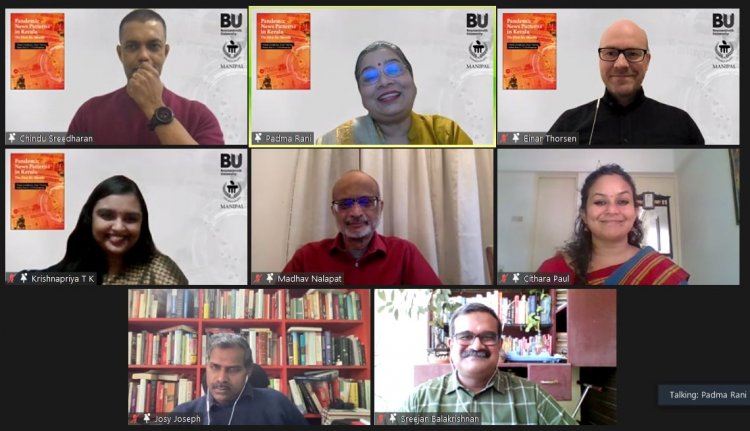Report by Bournemouth University, UK, and the Manipal Academy of Higher Education highlights lack of government scrutiny in Kerala's pandemic journalism, calls for 'crisis agility' in news media

Bengaluru:A new study has found that there is a pressing need for training journalists on reporting health emergencies and other disasters, including accessing scientific sources.
The study, which analysed the news coverage of Covid-19 in two prominent newspapers in Kerala, was released by veteran journalist and academic M D Nalapat and is titled Pandemic News Patterns in Kerala: The First Six Months.
The research was undertaken by Bournemouth University, UK, and the Manipal Academy of Higher Education. It analysed the reporting of Covid-19 in the Malayala Manorama and The New Indian Express over six months to understand the key areas of focus as well as patterns in the media's approach in reporting Covid-19. For further insights, the researchers also interviewed journalists who were involved in reporting the pandemic.
Speaking about the study M D Nalapat, Editorial Director of ITV Network and UNESCO Peace Chair at Manipal Academy of Higher Education said "Covid-19 changed the world much the way 9/11 did. An early success story was Kerala, and it is the media representation of the pandemic that has been explored in this report. This is essential reading for both media and health professionals."
"News media have a complex role to play during crises situations," said Dr Chindu Sreedharan of Bournemouth University, who authored the report together with colleague Prof Einar Thorsen, and Dr.Padma Rani, and Ms T K Krishna Priya of the Manipal Education of Higher Education. "It needs to balance its watchdog function of scrutinising the government responses to the emergency, with aiding the government in disseminating key information to the public. This is a difficult job, one that journalists often find difficult."
The study found that in the first six months of the pandemic, while journalists in Kerala were particularly careful of avoid fake news and sensationalism, there was limited scrutiny or questioning of the government decisions in their reportage. The news media emphasised official narratives during this time, relying heavily on 'elite', government sources. Kerala government (26.2%) and India government (14.3%) were the most dominant sources in the news stories analysed.
"The vital, watchdog function of journalism suffered significantly in the first six months," Dr Sreedharan said. "Only 3.8% of the news articles we analysed scrutinised the government in some form during this period."
The study also found that while the reliance on government sources was high, by contrast, expert sources relating to the pandemic featured less in the news coverage. Scientists and medical researchers, and the World Health Organisation were cited significantly fewer times — 4.9% and 3%, respectively — compared to government sources.
Another pertinent finding of the study is the lack of crisis journalism training opportunities for Kerala journalists, despite the increased health and other crises events the state has faced since 2018, including landslides, floods, and the Nipah virus.
"Most journalists we interviewed had not received any form of crisis journalism training and indicated an interest in capacity-building in this area," said co-author Krishnapriya. "Our findings indicate the need for news outlets, journalism associations, and educational institutions to invest more in providing crisis reporting training. Given the range of crises we face today, there is more demand than ever for journalists to be 'crisis-agile', to have the ability to function in any type of crisis."
The report highlights four areas of action for journalists to focus on. Recommendations include news outlets identifying risk scenarios in advance and developing operational contingency plans; preparing crisis-specific editorial strategy and reporting protocols; establishing checks and balances to ensure adequate scrutiny of government responses; and facilitating continuing crisis training and capacity-building opportunities for journalists.
The release of the report was followed by a roundtable discussion on the challenges of reporting the pandemic, chaired by Prof Nalapat. Panellists included Cithara Paul, Kerala correspondent of The Week; Josy Joseph, investigative journalist and author; and B Sreejan, associate editor of The New Indian Express.
The full research report can be downloaded here: https://eprints.bournemouth.ac.uk/36557/















































